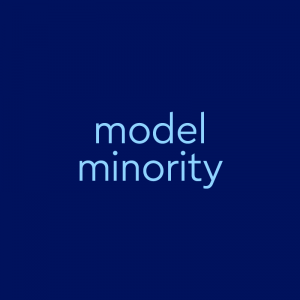Historical & Current Events dictionary
model minority
[ mod-l mahy-nawr-i-tee ]
What does model minority mean?
The term model minority refers to a minority group or a member of such a group stereotypically viewed as being more successful than other such groups or individuals. It is most often applied to Asian Americans.
In this context, the word minority is used in the sense of “a racial, ethnic, religious, or social subdivision of a society that is subordinated in political, financial, or social power by the dominant group, without regard to the size of these groups.” The word model implies that the group should be viewed as a standard or ideal example for imitation or comparison by other groups due to supposedly being more successful.
The idea behind the term model minority is criticized as a form of stereotyping that also ignores or obscures not only the racism and discrimination that Asian Americans face but also the wide diversity among Asian Americans. It is also criticized for serving to perpetuate white supremacy and create divisions between minority groups.
The term model minority myth is used to criticize the idea of the model minority as false (and widespread).
Example: The article singles out Asians as a model minority, relying on the same old stereotypes about hard work and family values—as if all Asian American people were exactly the same.
Where does model minority come from?

The term model minority was introduced by sociologist William Peterson in his 1966 article in The New York Times Magazine about the “success story” of Japanese Americans in the US. In the article, Peterson asserts that Japanese Americans—despite facing intense racism and discrimination (including internment during World War II)—achieved success in a way that other minority groups had not. In citing the reasons why he believes this occurred, Peterson contrasts Japanese Americans with groups he labels as “problem minorities”—those he says had failed to overcome the barriers placed on them by a racist majority.
Critics of both the term and concept cite them as contributing to what they call the model minority myth: the false but pervasive idea that all Asian American are equally economically and socially successful.
Such stereotypes are often rooted in statistics showing that Asian Americans have, on average, higher college education rates and incomes than any other group in the US (including white Americans). However, statistics also show that income inequality is high among Asian Americans, meaning that there is a large gap between the highest-earning and the lowest-earning Asian Americans.
When critics use the term model minority myth, they often point out these kinds of disparities as evidence of the range of differences among Asian Americans—disparities and differences that are ignored or obscured through the use of the term model minority and what it implies.
Critics also point out that selective accounts of Asian Americans’ success imply that racism and white supremacy aren’t pervasive problems—that struggles faced by other minority groups are not products of oppression but instead of a failure to do the right things needed to succeed.
Examples of model minority
Who uses model minority?
The term model minority is often used in a critical way to reject such stereotypes and other implications of the term. It is especially associated with Asian Americans.
"I think there's a misimpression of who Asians are. A lot of people call us the model minority, they don't realize that there's many Asians who live below the poverty line," Debra Wong Yang says. "We need to come together and stand together." https://t.co/LAfoRhRzAi
— NBC Asian America (@NBCAsianAmerica) May 18, 2021
Asian Americans are often markedly absent from narratives about poverty and hunger, and part of what contributes to this absence is the “model minority” stereotype, which serves to obscure food insecurity within this population."@CivilEats | #TeresaMokhttps://t.co/MM44QW46f7
— Castanea Fellowship (@CastaneaFellows) May 19, 2021
Tired of people stereotyping all Asians to denigrate Blacks and/or Latinos.
I declare independence from your model minority myth.
— Jose Antonio Vargas (@joseiswriting) January 29, 2016
Note
This is not meant to be a formal definition of model minority like most terms we define on Dictionary.com, but is rather an informal word summary that hopefully touches upon the key aspects of the meaning and usage of model minority that will help our users expand their word mastery.